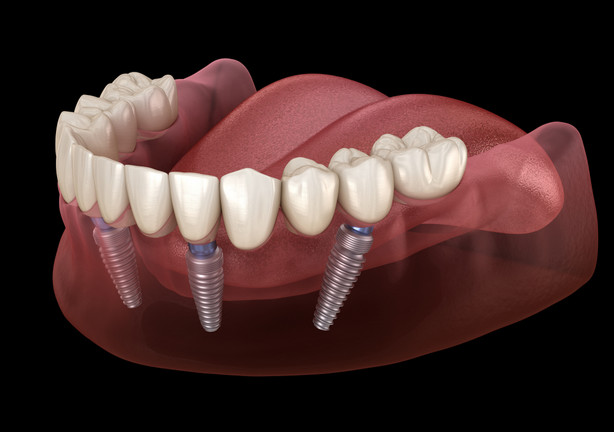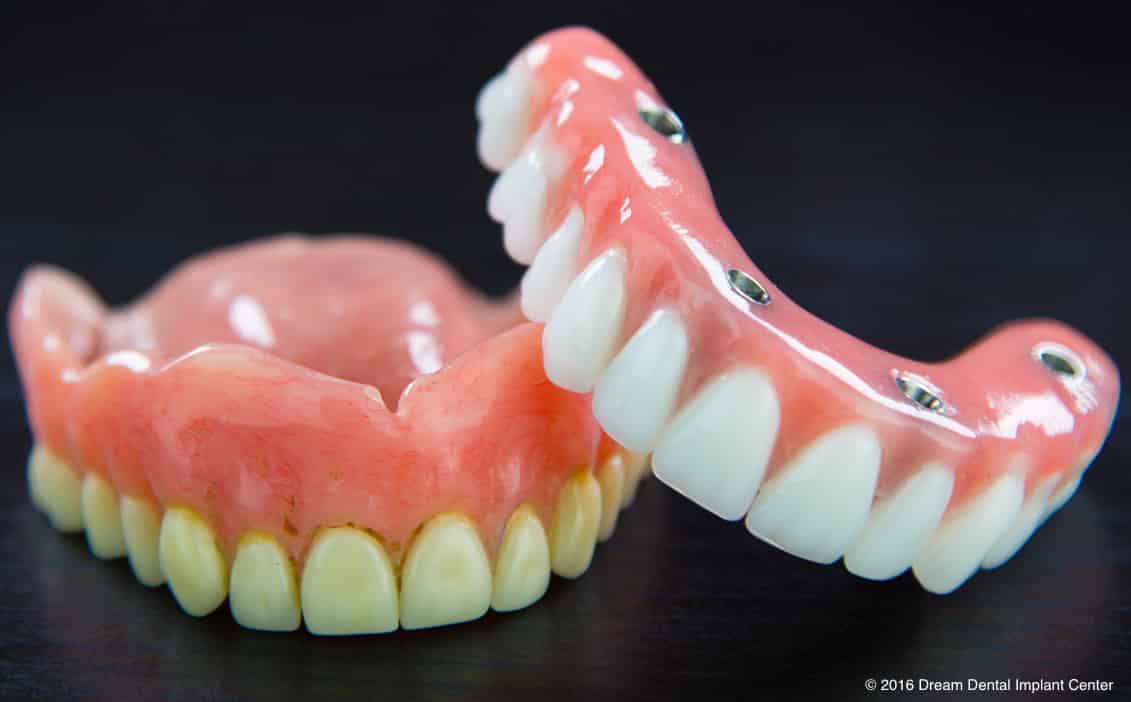Video Transcript:
Why do implants fail? What causes implant failure? People ask, “What’s your success rate?” Well, I would say my success rate is pretty typical to what other doctors are in the country. Somewhere between 95 and 98% is what I would say.
There’s really three parts to any implant. Okay? You have the implant that goes into the bone. It’s like a screw that literally is screwed into the bone. So you have an implant, this would be your bone. Your tissue would be just a little bit higher than that. So tissue would be up here. And inside that implant, you’re going to have a post that comes in here with a screw. And that post comes up like this. So post is screwed into the implant. And then on top of this, there’s the crown. The crown connects to this post.
There’s two types of crowns. You can have a crown that’s retained by a screw or a crown that’s retained by cement. And there’s different indications for each. It’s not necessarily that one is better than the other. I like screw retained crowns better for the most part, but sometimes a cement retained crown is the only thing we can do. But the success of a crown is largely related to the type of material used, the overall fit to the post.
The last thing would be they’re grinding their teeth at night. So even the best crown, if it has so much forces on it, that can cause problems. So if you’re grinding so hard, the screw that connects this into here will become loose and this whole thing gets loose. If his whole thing is getting loose and it breaks, now this implant can be compromised all together.
How well is this implant supported by bone around it? So we look at that through x-rays and CT images and then we look at the health of the tissue. The patient complaining about getting food caught. If it’s red, it’s irritated, it can turn into implantitus, which basically means that once this gets so irritated, now the bone starts to drop. And so at what point does an implant truly fell? As you start to lose bone the patient may not notice anything if losing bone over time and if you catch it early, the success of this implant long term can be saved. But if you wait years and years, the bone level is here, now all of a sudden that bone level drops to here. Can you see? That’s a big problem. Now we have threads and it’s all exposed. It’s hard to clean. But what happens is some patients will come back, it’s here and the implants actually moving. Now we’ve lost the implant.
There’s early failure and there’s late failure. Let’s define early failure as the first six months, okay? This is where the implant is placed and then in the first six months for some reason the implant does not integrate. We put it into the bone and we hope because it’s bio inert, meaning that it doesn’t react or cause an inflammatory process that the body is going to accept it and grow around it. I kind of see it as doctor related problems and then patient related problems. So within early failure with the doctor, this would be where a doctor puts an implant in on someone that’s not healthy. Maybe they have diabetes. Perhaps they are a big smoker. Perhaps they’re going through treatment, cancer treatment or some type of really aggressive treatment where their body’s has a lot of medications inside of it where the body isn’t in great equilibrium.
Basically we look at what the person’s blood sugar is, what’s their blood pressure like, what’s their cholesterol like? We literally ask every patient to go get a blood test. If they haven’t had blood drawn in the past six months, we ask them to go draw blood. But we let the doctor read it and then we’re able to look at that and make a decision if they’re healthy enough.
As far as surgical technique, if there’s not good sterilization or not disinfection meaning the site isn’t super clean, debris that gets down into the site and that can cause an early infection. But sometimes you can have sites that become infected in the first few weeks and then you have to take the implant out and graft and start back over again.
In the first six months it’s really critical that there’s a good prosthetic plan. What that means, most doctors don’t put anything over an implant in the first six months, unless you’re doing it like me. I do temps all the time and if those temps aren’t made properly, you can have implant failure for sure. But if I was to say the number one overall reason why dentists fail in dentistry as a whole is because we just aren’t always great communicators. And so that’s why it’s super important that on the front end, during the process and at the end when you get your actual crown or device, that you have great communication with the doctor, that you ask the right questions and make sure they answer you.
Now it’s about what the patient can do wrong. Early fair the patient comes down to overall health. So you don’t want to lie to the doctor about your overall health. If you have diabetes and you don’t tell them, that’s a really big deal. Diabetes is one of those things that really compromises your ability to heal and that’s why we take more measures to make sure that someone’s healthy enough. And during that six months while you’re healing, making sure you stay healthy too, that you continue to manage any diseases that you currently have.
The biggest thing where patients can mess up and cause failure in implants is that it comes down to compliance. So if a doctor doesn’t communicate super well, the patient may not understand what the importance of compliance is. There’s the what and the why, right? The what is don’t eat hard foods. The why is because it’s going to make you redo the whole surgery again. Making sure you’re on a soft diet in the first week and a half, two weeks. We don’t want you on anything that has nuts, seeds, things that could get inside the suture lines because that can cause an infection. We’re trying to avoid any early infection. Most infections are going to happen in the first couple of weeks. Which couples with that with infection is making sure the patient’s taking antibiotics.
I’ve had patients that they’re very naturalistic and they don’t want to take any more medications. They say they’re going to, but then I find out they don’t, and this is a huge, huge risk. You need to make sure you stay on your antibiotics. We start antibiotics three days before and we do it seven days after. And then with very severe advance surgical cases where we’re doing more with the zygoma or the sinuses, we actually will sometimes do a second round of antibiotics. And sometimes in very severe cases, we’ll actually do a couple of different antibiotics together which is really important.
So we’ve talked about compliance, right? We’re talking about diet, we’re talking about medications, we’ve talked about antibiotics, now we’re looking at the importance of using your anti-inflammatories. So ibuprofen and we’ll prescribe a steroid too. But taking these medications as prescribed to keep the inflammation down. By keeping the inflammation down or the swelling down, it’s going to make it so that you’re going to heal faster. And your risk of having an infection goes down dramatically too. Not to mention you’re going to look a lot better. You’re not going to look like a chipmunk.
When my patients come back and they walk in the room, I can tell immediately if they listened to what I said. If they haven’t been taking their anti-inflammatories or the big thing is sleeping on your side or sleeping flat. If they do that, immediately I’d be like, “You slept on your right side,” or “You’ve slept flat,” because they just look like a chipmunk. All these things make the experience much more enjoyable and less risk of infection.
We also require the patient’s rest. We don’t want them going back to work. We don’t want them getting their heart rate going. We have patients that sometimes are like, “When can I go back and work out?” And I’m like, “Give it a week.”
The last thing I would say that’s most relevant in the early failure stage, it comes down to hygiene. You got to make sure you’re rinsing and cleaning. There’s a certain point where you don’t want to brush around your implant for the first couple of days because it sensitive. But after that we want you to brush your teeth. Hygiene during that first six months is critical. And to me that’s when I’m aggressive. I tell my patients, “I love you but I will call you on your stupidness. I can tell you’re not on a soft diet. I can tell you’re not cleaning it. You’ve got to do better. And if you’re not going to do better, you might as well plan on just putting more money towards because when this implant fails, I’m not going to replace it. It’s going to be your responsibility.”
Okay, so let’s shift gears now a little bit. Let’s go to late failure. Where can a doctor mess up that would cause implants to fail later on? It could be with the original prosthetic plan. Is it possible that the implant wasn’t placed in the right place, which maybe was to build a device or crown that doesn’t line up well? And it comes down to communication again. Communication to your patient about the importance of maintenance.
Cleaning is basically what it sounds like. You’re cleaning around the tissue, you’re cleaning around the device, you’re cleaning around the implant. But when we talk about maintenance, now that’s a totally different thing. Maintenance means that now we’re checking the overall health of the bone around the implant, the health of the tissue around the implant. The color, the shape, the consistency and that’s why it’s important to come and do regular checks because a good doctor will look at the wear patterns and in my case I have night guards on all my patients. A night guard actually protects your teeth so that you can’t do damage during the night. But you can see this and then you can modify it.
And so if the doctor doesn’t communicate the value in this, the patients just disappear. Patients get them put in and they say, “Sayonara.” And if we’re not great at communicating, “Hey listen, you’ve got to come back. Even if you don’t come back to me, you need to go somewhere else and you need to have it done regularly. You need to have it done by doctor that’s looking for these things. He’s looking for the bone health, he’s looking for the tissue health. He’s looking for the overall wear patterns and how you’re biting down and potential grinding.”
Another thing that can go wrong too is that the screw that goes into the implant itself, if you’re grinding, that screw can loosen up and so if you wait till it’s too late and the screw is loose and the crown is moving, patient bites down once and the screws snaps. Now all of a sudden we have a very serious problem where we have to go and try to rescue that screw tip, which is not easy and sometimes we can’t even do it and then we have to actually take the whole implant out.
So late failure. Talk about the doctor’s responsibility. Talk about the patient’s responsibility. We’re talking about maintenance visits, hygiene visits. We’re looking at overall health again and to say that when you place the implant you didn’t have diabetes, but now 10 years later you have really bad diabetes that will affect anything in your body. And if you get any diseases it’s caught early so it doesn’t affect the implants.
Don’t start smoking. Smoking would be the worst thing to do. We used to think that smoking, once an implant was healed, that it would be okay. Now all the studies out there saying that smoking, even after you’re all healed up, it causes implants slowly to lose bone over time.
There’s lots of factors here, but like I said, we started early failure and there’s late failure and the doctor has responsibilities and the patient has responsibilities. You should listen very carefully. Write down, we actually give notebooks to all of our patients. We want them to bring these notebooks back and continue to ask questions over the years so that we make sure that we answer them.
If there’s anyone out there that you know that has an implant and they’re having issues or struggling with it, share this video with them. I would love to help anyone out there that maybe needs a second opinion to see what we can do to help solve a problem for you.
But thank you so much. Appreciate you. Have a good day.




 Traditional dentures are now a thing of the past. At Dream Dental Implant Center, denture-wearing patients are experiencing life-changing results in upgrading their traditional dentures with dentures with All-on-4® dental implants and regaining their bite functionality, comfort, confidence and quality of life.
Traditional dentures are now a thing of the past. At Dream Dental Implant Center, denture-wearing patients are experiencing life-changing results in upgrading their traditional dentures with dentures with All-on-4® dental implants and regaining their bite functionality, comfort, confidence and quality of life.